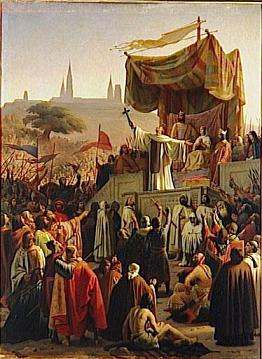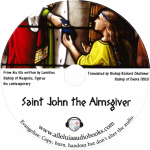Saint Bernard the Wonderworker : The Crusades and Saint Bernard
Click Here to Download the Entire AudioBook on St Bernard the Wonderworker.
Transcript
The formidable race of the Turks had established their empire over all the east, and from thence they threatened an invasion of the west. The nations of Europe, weakened by the dismemberment of their territories, and their civil dissensions, trembled at the approach of the waves of this impetuous torrent. How could its onward progress be arrested otherwise than by the union of all the people of Christendom? But, like all great undertakings, such a concourse and general uniting of nations could only be effected under the influence of a religious idea. The divine breath of religion only possesses the power of inspiring all men with one common sentiment, uniting them in one thought, and kindling among them an universal flame of generous enthusiasm.
The human mind, at that period, was, doubtless, unable to comprehend the sublime and vast ramifications of this great idea; man is almost always the blind instrument of a work which surpasses his understanding; the seed that he has sown can only be revealed by its fruit. The Crusaders, in their warlike ardor, aimed only at the deliverance of a sepulchre, and they were the deliverers of the world. But it was fitting that the essential idea of the Crusades should be displayed in all its simplicity, in order to be received and understood by the intellect of the age. The object in view was to rescue from the devil that sacred land above which the heavens had opened to give testimony to the Son of God. This was clear to the capacity of all, and the magical influence of this divine idea captivated the whole of Christendom, and revived its faith. The first result of this movement was a spirit of union among the nations, and a wonderful harmony of sentiments, thoughts, and interests, which unexpectedly put an end to all religious dissensions, political disturbances, and civil wars. In the next place, as a natural consequence, followed the exaltation of the Papacy, which always resume its place at the head of human affairs when the spirit of concord is to be revived among the nations. The Crusades alone gave to the Holy See more weight and influence in the affairs of the world than any doctrine, theory, or triumph by sword or word, before or since; and this central influence and great preponderance which it possessed was the mainspring of the development of the middle ages, and of the civilization of future times.
It is certainly true that the soldiers of the cross were not always guided by the spirit of God, or influenced by justice, charity, and truth ; we do not pretend to deny the monstrous abuses which too often disgraced their enterprises. But, in this place, the only important point for consideration is the great idea which predominates over all these questions; and it is rather by this idea than by the fact which resulted therefrom, that we must judge of the man whose fiery eloquence aroused the spirit of the Crusades. Eugenius III had the interests of the Eastern Church so much at heart,, knowing the high endowments and supernatural gifts of St. Bernard, and Bernard, full of zeal for the Church, and deference towards its Head, courageously accepted the weighty burthen of this apostolic mission.
St Bernard after having given the Cross to the King of France felt himself interiorly moved to go amongst these valiant Teutons, so renowned for their bravery, that he might enroll them in the service of Christ. Doubtless he foresaw that he would reap an abundant harvest ; but he was not prepared for a success surpassing that which he obtained in France. His zeal allowed of no delay; he took no account of the severity of the season, nor of the fatigues of the journey, nor of his continual infirmities ; and, about the end of the autumn of the same year (1146), a short time after the assembly of Chartres, he set out, accompanied by two monks of Clairvaux — Godfrey, his biographer, and Gerard.
Here begins a long series of labors and miracles, which the companions of the holy monk registered day by day and which are loudly attested by contemporary historians, which the twelfth century, with one Toice, has related for the admiration of posterity, and which even the most incredulous writers have been forced to admit, though they could not comprehend them.* Godfrey, one of the secretaries of the illustrious abbot during this journey, comforted the community at Clairvaux, by sending them a faithful account of the miracles wrought in Germany; and this writer, whose style is so admirable for its ingenuous simplicity, complains that his pen cannot suffice to relate so many things. ‘ The servant of God,” he writes “works miracles more easily than we can write them.” From his person seemed to flow all those virtues which once characterized the divine mission of the greatest apostles. His breath, his blessing, his touch, his prayer, his very presence, wrought prodigies of wonder The most inveterate maladies disappeared suddenly at the voice of the man of God; whole populations, in a number of different towns, published, with gratitude, the miracles they had witnessed. In every place on his journey and wrought the most astonishing and instantaneous cures : the blind recovered their sight ; to the deaf and dumb hearing and speech were restored ; the paralytic received the use of their limbs; the possessed, the lunatic, and the demoniac were delivered from the spirits which tormented them. But the greatest of his miracles was the conversion of hardened hearts and the penances to which public sinners submitted.
One day an immense crowd gathered in the church to see the face of the man of God. He had suddenly cured a paralytic old man, who was known throughout the town for his bountiful alms-deeds ; and this miracle, as well as many others no less striking, had been proclaimed by the chimes of the bells and the admiring cries of the multitude. The concourse was so great that no power could restrain the crowds of the people, who rushed impetuously into the vast basilica. St. Bernard, closely surrounded on all sides, would have been smothered by the crowd, had not the emperor, throwing off his mantle, raised him up in his powerful arms, and borne him away to a place of safety.*
In the same town. Count Adelphus, one of the nobles in the emperor’s train, was desirous of trying in person the effect of the power of the Abbot of Clairvaux He brought to him a blind and lame child, whose cure seemed to him utterly impossible. St Bernard blessed him, and, at the same moment, the child recovered the use of hii limbs, and his eyes were opened.
We may conceive the sensation caused by these wonders, and the weight which they added to the mission of him who performed them. The people demanded the cross ; but the princes, who were restrained by political considerations, wavered in a state of anxious perplexity.
St. Bernard, from that tune, foresaw what would be the happy result of his labors ; however, like the wise husband-man, he thought it would be well to quit for a tune the field he had cultivated, and to leave the care of ripening the seeds of the word to the power of divine grace.
Hermann, Bishop of Constance, earnestly entreated him to edify his vast diocese by preaching the Crusade. For a long time Bernard resisted, but, at length, overcome by the constancy of my Lord of Constance, he embarked with him, and sailed up the Rhine. They stopped at the towns and principal villages on the banks of the river, and reaped everywhere the most abundant fruits from the preaching of the cross. This voyage was a kind of triumphal march. A numerous train followed St. Bernard. The company consisted of eleven venerable persons besides Bernard ; and every evening they used to note down, in an itinerary journal, the glorious actions which they had witnessed. But they were unable to write down all : “it would require volumes to recount all we have seen” says one of tbem; “but if we were silent the stones would cry out” Philip of Clairvaux sent to the Archbishop of Rheims an extract from his journal, which has been preserved intact; and this curious document, together with many others of that time, will enable the reader to follow the apostolic journeys of St. Bernard, step by step.
Let us hear the travellers speak :
”Bishop Hermann. — The first day, at Friburg, there were only some poor, mean people, who asked for the cross. The holy abbot made us pray that the eyes of the rich might also be opened, and hardly was this prayer ended, when the richest — n/iy, even the most hardened — came to receive the cross from his own hand.
”Philip. — Let us note down, likewise, the manner in which he restored sight to a blind old man; virtue had gone out of our holy father; not from him, however, but from the word and the sign of life.
“Hermann. — This morning, fourth feria, after mass, I presented to hun a girl who had a withered hand ; he cured her on the spot.”
” Philip. — I saw him restore sight to a child deaf aiMi dumb from his birth.
“* Hermann. — I myself spoke to the child at the moment #hen the sign of the cross was made on him, and he heard and answered me distinctly.
” The Abbot Frovinus. — A mother brought us her little blind child ; the sign of the cross restored his sight ; but what was the mother’s surprise when the child stretched out his hand to an apple which I offered to him!”
“Eberhard. — On leaving the church, an infirm and paralytic man, who could only drag himself along, recommended himself to the holy abbot. Hardly had the latter touched him with his stick, in my presence, than the man felt himself cured, and went away, leaping for joy.”*
These miracles, which are noted down simply and shortly, one after another, by ocular witnesses, would form too large a volume, if we were to place them under the eyes of our readers. They were so numerous that the witnesses themselves were unable to detail them all., Bernard cured, in one day, nine blind persons, ten who were deaf or dumb, and eighteen lame or paralytic ; on the following Wednesday, at Schafhausen, the number of his miracles was still greater. At last, on Friday, the 13th of December, they arrived at Constance. The bells of the town announced the wonders which attended the footsteps of the man of God. The people, with a thousand cries of ” Kyrie eleison .'” “Kyrie eleison” ran to meet him, giving glory to Jesus Christ. All praised God, and not one mouth was silent in the midst of these joyful manifestations. The preaching of the Crusade seemed to have become a mere accessory in this universal agitation. He spoke — or, rather, he showed himself — and, at the mere Sight of the apostle, at the first sound of his voice, the people burst into tears ; and the minds of his hearers became humble and docile, and answered his appeal. Thus, a long stay in each town was not only unnecessary, but even impossible, on account of the tumultuous concourse of people who flocked together, desirous to hear the saint’s words, and still more anxious to see his miracles. At Constance, as at Frankfort, he was nearly suffocated. His garments were torn off, piecemeal, to make crosses, which he found very inconvenient ; and he was frequently obliged to accept new clothes.
It was about this time that St. Bernard converted a young knight, who was rich in earthly goods, but poor in those of heaven, and full of vice and iniquity. His name was Henry; he had received a good education; and as he spoke French and German, he attached himself to the saint, to serve as his interpreter. This remarkable conversion produced a no less remarkable miracle, which we must not pass over in silence. The noble Henry was riding alongside of St. Bernard, on the highway, when he was, all at once, followed by one of his former squires, who attacked him with jeers and insults. He was a man of Belial, a lover of perversity, and incredulous in all things; he blasphemed the servant of God, and cried out with all his might, “Go, follow the devil ; and may the devil take you!” While the travelers thus continued their journey in peace, the holy abbot was entreated to give his blessing to a crippled woman, whom they laid at his feet. This occurrence only served to increase the fury of the madman ; but when he beheld the woman suddenly cured, he fell back, as if struck by an unseen hand, and lay stretched on the earth, without life or motion. His former master, horrified at his awful death, cast himself at St. Bernard’s feet, and implored him to take pity on this soul, which Satan had filled with malediction. “It is on your account,” he said, “it is because he blasphemed against you, that this terrible judgment has befallen him!” “God forbid,” replied the saint, “that anyone should die on my account!” Then, retracing his steps, he leaned over the corpse of the squire, and slowly recited the Lord’s prayer, his voice tremulous with emotion. “Hold him by the head,” he said, to the numerous standers-by. Then, anointing him with his spittle, which he frequently used as if it were a medicinal remedy, he cried out, “In the name of the Lord, arise!” And he repeated, “In the name of the Father, and of the Son, and of the Holy Ghost, may God restore thee to life I” These words, uttered in a solemn tone, amidst the mournful silence of the spectators, had hardly ceased, when the dead man arose, and looked up to heaven. At the sight of this corpse, erect, and restored to life, the people manifested their admiration and surprise by loud acclamations. The saint, meanwhile, addressed him as follows : “Now,” he said, “what are thy dispositions? what art thou about to do ?” ” My father, I will do all you command,” replied the squire, who was completely changed. He took the cross, and enrolled himself in the ranks of the Crusaders. One of those present asked him if he had really been dead. “I was dead,” he answered, “and I heard the sentence of my condemnation ; for if the holy abbot had not interposed, I should now be in hell.” Henry, who was more deeply struck than the rest by this extraordinary event, retired to Clairvaux, where he made his profession; and he was oftentimes wont to relate to his assembled brethren the grace which he had received, and the wonderful prodigy which he had witnessed.
Download MP3 of St Bernard the Wonder Worker: The Crusades and St Bernard (Right Click and Select Save As)
Click Here to Go Back To the AudioBook Page
Click here to make a novena to St Bernard
Credits
Saint Bernard the wonder worker, excerpts from the Life and Times of Saint Bernard by Abbot Theodore Ratisbonne and Heroic Virtue: A Portion of the Treatise of Benedict XIV on the Beatification and Canonization of the Servants of God Volume III.
Image is used from the Public Domain
You may also like:
- Saint Bernard the Wonderworker: Part 3 More Miracles in Milan
- Saint Bernard the Wonderworker: Part 2 The Labors of Saint Bernard in Milan
- Saint Bernard the Wonderworker: Part 1 Early Miracles of St Bernard.
- Catholic Audiobook: St. Bernard the Wonderworker
- Catholic Audiobook: The Betrayel Of Judas and The Denial of Peter
- Catholic Audiobook: St. Thomas Aquinas for Lent
- Homilies of the Fathers for Lent






